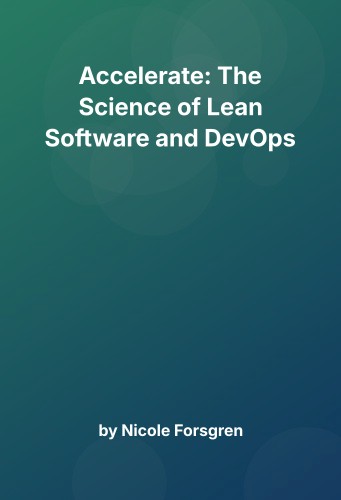Accelerating Software Development Through Lean and DevOps
In “Accelerate: The Science of Lean Software and DevOps,” Nicole Forsgren provides a comprehensive exploration of how organizations can enhance their software development processes by adopting lean principles and DevOps practices. This book serves as a strategic guide for professionals seeking to improve efficiency, productivity, and innovation in their digital transformation journeys. Forsgren’s work is grounded in empirical research, offering evidence-based insights that challenge traditional approaches to software development.
The Foundations of Lean and DevOps
At the heart of Forsgren’s analysis is the integration of lean principles with DevOps practices. Lean software development emphasizes waste reduction, continuous improvement, and delivering value to customers swiftly. DevOps, on the other hand, focuses on breaking down silos between development and operations teams to foster a culture of collaboration and rapid deployment.
Forsgren highlights that successful implementation of these methodologies requires a shift in mindset. Organizations must prioritize continuous learning, experimentation, and feedback loops. By doing so, they can create a culture that supports innovation and adaptability, essential traits in today’s fast-paced digital landscape. This is similar to the approaches outlined in “The Phoenix Project” by Gene Kim, Kevin Behr, and George Spafford, which also emphasizes the importance of removing bottlenecks and enhancing flow within IT operations.
Core Frameworks and Concepts
Forsgren introduces a systematic framework for implementing lean and DevOps practices effectively. The framework comprises several essential components:
1. Measurement and Metrics
The foundation of any improvement initiative is understanding where you currently stand. Forsgren emphasizes the importance of using key performance indicators (KPIs) to measure the effectiveness of software development processes. Deployment frequency, lead time for changes, mean time to recovery, and change failure rate are highlighted as critical metrics that provide insights into productivity and efficiency.
For instance, the book “Measure What Matters” by John Doerr also underscores the value of setting specific objectives and key results (OKRs) to drive performance. By focusing on measurable outcomes, organizations can track progress and make informed decisions to propel growth.
2. Cultural Transformation
A shift towards lean and DevOps requires a cultural transformation. Forsgren draws on the principles of agile methodologies to advocate for the development of cross-functional teams capable of responding swiftly to changes. Empowering teams to make decisions and take ownership of their work fosters increased motivation and accountability.
3. Leadership and Vision
Leadership plays a pivotal role in driving the cultural and procedural changes necessary for successful lean and DevOps adoption. Leaders should embody the principles of servant leadership, as described by Robert K. Greenleaf, prioritizing the growth and well-being of team members. By fostering an environment of trust and psychological safety, leaders can encourage innovation and continuous improvement.
4. Technology Integration
Forsgren explores how modern technologies, such as artificial intelligence (AI) and cloud computing, can enhance lean and DevOps practices. AI can automate routine tasks and analyze large datasets, providing predictive insights that guide decision-making. Meanwhile, cloud computing offers scalability and flexibility, enabling teams to deploy and manage applications more efficiently.
5. Overcoming Resistance
Implementing lean and DevOps practices is not without its challenges. Forsgren identifies several common obstacles, such as resistance to change, lack of skills, and organizational silos. Organizations must invest in training and development, foster a culture of collaboration, and align their goals with customer needs to overcome these challenges.
Key Themes
1. High-Performance Teams
A critical component of lean and DevOps success is the formation of high-performance teams. Forsgren argues that empowering teams leads to increased motivation, accountability, and ultimately, better outcomes. This empowerment aligns with concepts from “Team of Teams” by General Stanley McChrystal, where decentralized decision-making and team autonomy are highlighted as crucial for agility and responsiveness.
2. Continuous Improvement and Feedback Loops
Continuous improvement is a cornerstone of lean and DevOps. Forsgren emphasizes the importance of establishing feedback loops to drive iterative development and enhance processes over time. This principle is akin to the “Build-Measure-Learn” cycle described in Eric Ries’s “The Lean Startup,” where iterative learning is used to drive innovation and product development.
3. Measuring Performance and Outcomes
Forsgren introduces several KPIs that organizations can use to measure the effectiveness of their lean and DevOps initiatives. Deployment frequency, lead time for changes, mean time to recovery, and change failure rate are highlighted as critical metrics to track progress. The importance of value stream mapping, a technique borrowed from lean manufacturing, is also discussed. This approach helps organizations visualize their processes, identify bottlenecks, and streamline workflows to enhance efficiency.
4. The Role of Leadership in Transformation
Leadership is pivotal in driving cultural and procedural changes. Forsgren contrasts traditional command-and-control leadership styles with servant leadership, which prioritizes the growth and well-being of team members. By adopting a servant leadership approach, leaders can create a supportive environment that encourages innovation and continuous improvement.
5. Integrating Modern Technologies
Forsgren explores how technologies like AI and cloud computing can enhance lean and DevOps practices. AI can automate tasks and provide predictive insights, while cloud computing offers scalability and flexibility. By integrating these technologies, organizations can stay competitive and meet evolving customer needs.
Final Reflection: A Strategic Path Forward
“Accelerate: The Science of Lean Software and DevOps” offers a strategic framework for organizations seeking to enhance their software development processes. By integrating lean principles with DevOps practices, organizations can create high-performance teams, measure success, and leverage modern technologies to drive innovation.
Forsgren’s work serves as a valuable resource for professionals navigating digital transformation complexities. The integration of insights from related literature, such as “The Phoenix Project” and “The Lean Startup,” provides a comprehensive understanding of how to overcome challenges and implement effective strategies. By adopting the insights and strategies presented in this book, organizations can accelerate their journey towards becoming agile, customer-centric, and future-ready, showcasing cross-domain relevance in leadership, design, and change management.

